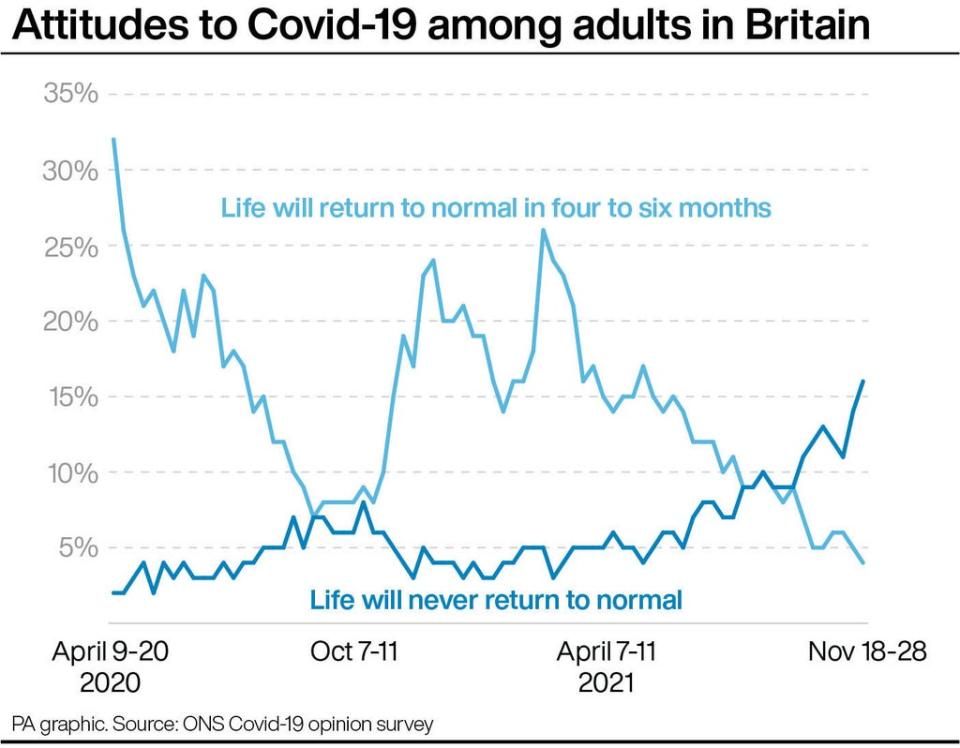How someone first encounters Covid ‘shapes their future immune response’

Whichever wave or variant caused an individual’s coronavirus infection shapes their response to subsequent infections, according to a new study.
This is something called immune imprinting, and researchers found that people imprinted by the Alpha variant make different responses to the Delta variant.
The scientists also found that imprinting differences were associated with different levels of waning immunity.
In those vaccinated, but not previously infected, antibody protection against Delta waned to zero by week 21 after a second dose, according to the study published in the Science journal.
But memory B cells, which also make up part of the immune system, persist, and boosters can help rescue antibody levels.
Researchers say their findings may have implications for the development of future Covid-19 vaccines.

Danny Altmann, professor of immunology at Imperial College London said: “I think that what we’re saying is the simple answer of saying ‘let’s have a new tweak vaccine every six or nine months’ may not be the best way to go.”
He added: “ We’re not criticising any of the vaccine approaches, or any of the attempts to tweak them to the new variants.
“But I think what we are trying to say loud and clear, and try to be helpful, is that Alpha and Beta and Gamma and Delta and Omicron have come at us thick and fast.
“And sure, you could jump to tweak the vaccines for different parts of the world at regular intervals.
“But the take-home message is, it’s not as if you start with a blank sheet. Each time you start with a pre-existing repertoire.
“That’s what the immune imprinting concept is all about. So we’d love to slow down and do the homework properly and try and find out which version of this is going to give you the best future-approved answer.”

Speaking in reference to the Omicron variant, Rosemary Boyton, professor of immunology and respiratory medicine, Imperial College London: “The existing vaccines do appear to protect from hospitalisation and death, which is important.
“And there’s no reason for us to think that that’s not going to be the case. So this is speculation for any subsequent variants.
“What our paper is showing is that you do have to think about it and it’s a more complex situation.
“So you can’t just think, I’m going to slot in this new sequence from a new variant, and that’s going to solve all the problems, because that’s probably not going to be the case.
“What we’ve got to look for is a vaccine strategy that has a very broad repertoire.”
Prof Boyton told a press briefing that it is difficult to make direct comparisons with the data emerging from South Africa as it has a very different population with a history of infection from different variants, and the vaccination rates are not comparable.
The NHS is working on plans to offer #COVID19 booster doses from a minimum of three months after the second dose 📅
Please wait until you are called forward by the NHS before trying to book at this interval.
More info: https://t.co/nmFGy0ojEJ pic.twitter.com/eJhi4qSMGd— Department of Health and Social Care (@DHSCgovuk) December 3, 2021
She said: “We’re absolutely saying that if you’ve been, if you have a different immunological history, in terms of the types of spikes you’ve encountered, then you will have a different repertoire of immune response.
“And so it does make it extremely difficult to make those broad comparisons.”
Prof Altmann said that when he first found out about the Omicron mutations he was quite fast to say he was “terrified” by them.
He added: “And I’m still kind of terrified by them, but I’m also kind of calmed by the real-life on-the-ground data and saying that it looks like even there, in a country of fairly low vaccination uptake, vaccines are holding up to some extent against it.
“And I think what it means for this country, I think it will calm down, because the jury’s out.
“We’ve got a high level of vaccination and a backdrop of Delta, and we don’t know if it can displace Delta.”
Asked whether he thought boosters would be needed in years to come, Prof Altmann said: “It may be that we may be reaching a stage where we’ve primed the immune response so beautifully that the memory lingers in there, and we don’t need to be thinking about constant boosters.
“So I don’t necessarily foresee a future of constant boosters. I think the immune system might do its stuff.”
Read More
Rapid test ‘identifies antibody effectiveness against Covid variants’
Spreading of Covid restriction misinformation branded ‘disgraceful’ by O’Neill
Omicron ‘has substantial ability to reinfect people who have had Covid’

 Yahoo Finance
Yahoo Finance 